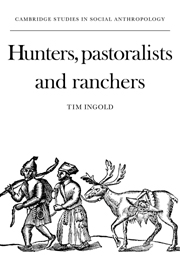Book contents
- Frontmatter
- Contents
- List of figures and tables
- Preface
- Prologue: On reindeer and men
- 1 Predation and protection
- 2 Taming, herding and breeding
- 3 Modes of production (1): hunting to pastoralism
- 4 Modes of production (2): pastoralism to ranching
- Epilogue: On band organization, leadership and ideology
- Locations of circumboreal peoples
- Appendix: The names and locations of circumboreal peoples
- Notes
- Bibliography
- Author index
- Subject index
1 - Predation and protection
Published online by Cambridge University Press: 12 September 2009
- Frontmatter
- Contents
- List of figures and tables
- Preface
- Prologue: On reindeer and men
- 1 Predation and protection
- 2 Taming, herding and breeding
- 3 Modes of production (1): hunting to pastoralism
- 4 Modes of production (2): pastoralism to ranching
- Epilogue: On band organization, leadership and ideology
- Locations of circumboreal peoples
- Appendix: The names and locations of circumboreal peoples
- Notes
- Bibliography
- Author index
- Subject index
Summary
Interspecific associations
Hunters are, by definition, predators. Yet it has been said that they are parasitic on nature, merely tapping the wealth she provides, whereas pastoralists co-operate symbiotically in its creation (Childe 1942:30). Conversely, the reindeer pastoralist has been called a ‘social parasite’ on his herd (Zeuner 1963:47), while the hunter of the arctic barrens, dependent for his livelihood on this single animal resource, may readily be construed to exist in symbiosis with it. Classification of the types of ecological association that can emerge between local populations of different species under natural conditions has yielded a vocabulary rich in ambiguity which, when extended to man as one party to the relationship, can convey subtle moral overtones, suggesting a scheme of evolving sociability. Where the parasite is nasty and capricious, the predator is noble but savage, and the symbiote a loving friend.
Discussion of the dynamics of human predation must therefore be prefaced by an attempt at a more precise definition of the range of natural interspecific associations. My purpose is to show that the symbiotic aspect of pastoralism, which lies primarily in the protection of herds by man, generates a disequilibrium in the system constituted by relations between the herbivorous prey, its predators, and its food supply.
- Type
- Chapter
- Information
- Hunters, Pastoralists and RanchersReindeer Economies and their Transformations, pp. 27 - 81Publisher: Cambridge University PressPrint publication year: 1980



